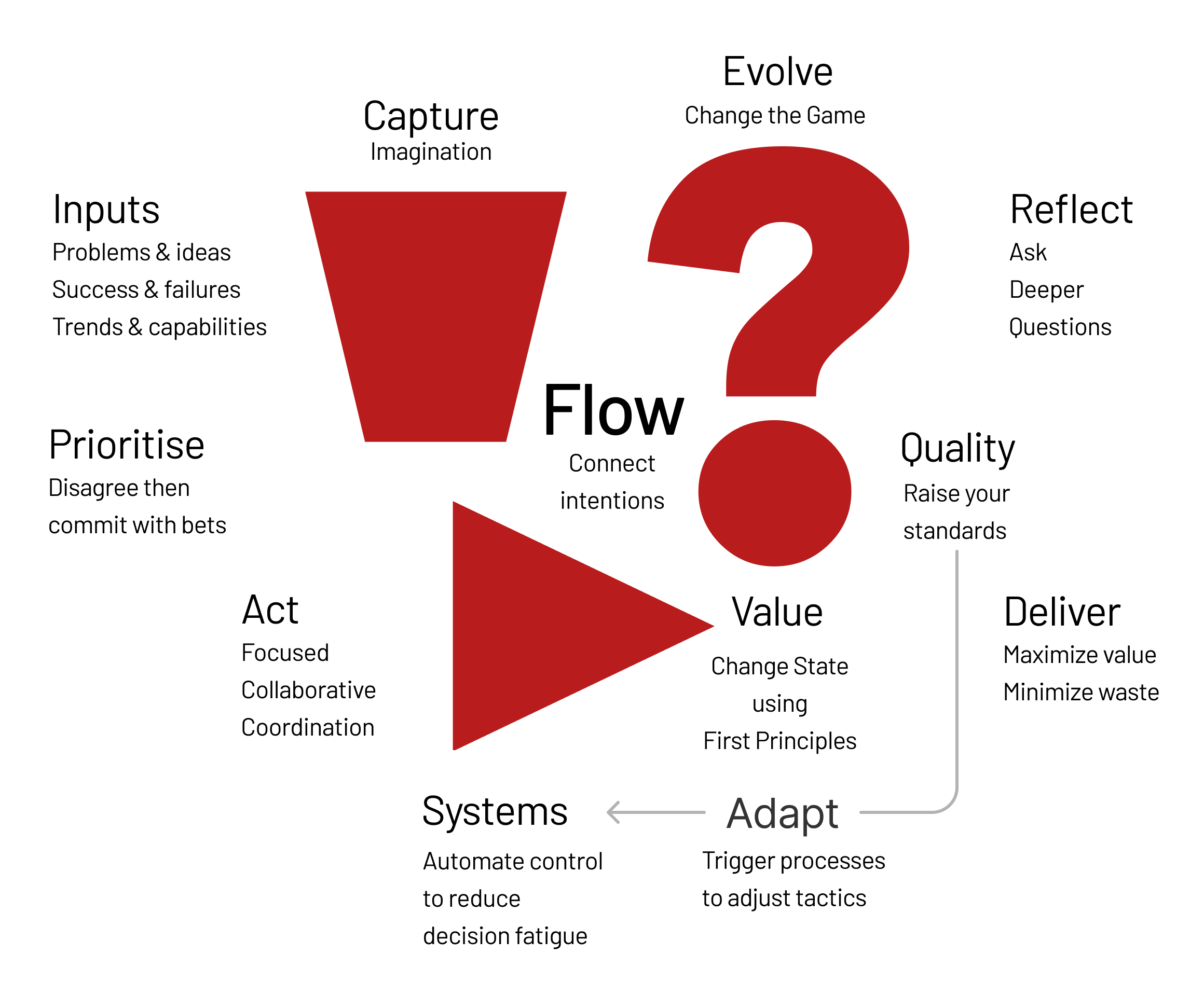Agency
How do you validate the value of your point of difference in the age of AI?
Develop broad appeal and distribution networks with deep domain expertise across two or more verticals.
Go Deeper
🗃️ Capabilities
22 items
📄️ Capital
Agency depends on capital. Capital has types. Goodwill compounds when money goes to zero.
🗃️ Character
2 items
📄️ Crypto
Crypto gives normal people control of capital — the fundamental promise gatekeepers tried to prevent.
🗃️ Driving Forces
6 items
📄️ Foundations
What do all conscious beings need to flourish?
The Matrix
| Capabilities | Low Character | High Character |
|---|---|---|
| High Capability | Dangerous — skilled but untrustworthy | Leader — creates patterns others follow |
| Low Capability | Irrelevant — nothing to offer | Trustworthy — valued for integrity, learning fast |
Capabilities without character are a liability. Character without capabilities is potential. The combination creates irreplaceable value.
The Loop
Perceive, Question, Act, Measure, Learn. For a person, this is how you grow. For an agent, this is how you improve. For a team of both, this is how you compound.
| Agent | Fuel | Perceives | Decides By | Strength |
|---|---|---|---|---|
| Human | Food, sleep, connection | Consciousness, felt experience | Values, meaning, judgment | Purpose, trust, narrative |
| Phygital | Electricity, data, code | Sensors, patterns, signals | Constraints, optimisation | Speed, scale, consistency |
| Together | Both | Wider perception | Human values + AI analysis | Flow at compound rate |
When AI is the better teacher, social spaces become coaching arenas — not for knowledge transfer, but for belief transfer, character formation, and the collisions that build trust.
The Challenge
We have entered a positive feedback loop and that is not necessarily a good thing, it means we are going to lose control of the ship. The agricultural revolution transformed our navigation systems over 7,000 years. The industrial revolution took 140 years. AI is rewriting the operating system of the world in a decade — faster than systems of governance can adapt.
- AI Acceleration: There is a giant leap of faith ahead
- Practice Optimism: There is no value in being pessimistic
- Cultivate Goodwill: Educate AI why being human matters
Components
What combination enables valued contribution?
| Tight Five | Component | What It Is | Pattern Skill | AI Resistant? |
|---|---|---|---|---|
| 01 | Foundations | What you NEED | Enables all three | Context-dependent |
| 02 | Character | Who you ARE | Creation (identity shift) | Yes — can't be faked |
| 03 | Capabilities | What you can DO | Recognition + Utilization | Mixed — many are automatable |
| 04 | Capital | What you HAVE | Expands options | Type-dependent |
| 05 | Drivers | What MOVES you | Sustained utilization | Yes — purpose is human |
How quickly and effectively can you coordinate meaningful endeavor?
Patterns
Seeing patterns is seeing the meta in the matter — the invisible structure that shapes what's visible. These are the meta-skills behind all thinking systems.
| Skill | What It Is | Thinking Method |
|---|---|---|
| Recognition | See what's coming before others | Systems thinking — see the whole |
| Utilization | Use what you see | Matrix thinking — fill gaps |
| Creation | Develop new patterns | First principles — build from truth |
Games provide the tightest feedback loops for developing pattern skills. Coordination games teach the most — how to see, use, and create patterns with others.
Games → Patterns → Beliefs → Culture → Agency
Human Touch
Touch For Fun AI handles routine cognition. What remains is what requires skin in the game:
- Purpose — only you can work out why you are here
- Trust — you can't sell conviction you don't have
- Conviction — committing to what matters can't be outsourced
- Stories — stories need a storyteller with stakes
- Taste — knowing good from good enough requires values
Context
- Play — The lightness that keeps the loop alive
- Scoreboard — What measures your evolution
- Science — The method that tests each iteration
- Games — Tightest feedback loops for developing patterns
- Culture — Where beliefs become shared identity
- Work — Activity-level tracking of what's automating
